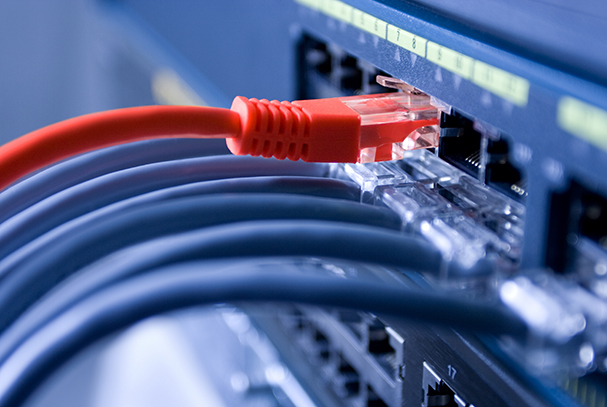When selecting an Ethernet cable for your business, you’ll want to consider factors such as cost, speed, and the length of the cable. The type of Ethernet cable you use can affect your internet connection quality and speed, so it’s important to select the right one. In this blog post, we’ll explain the types of Ethernet cables available and what you should consider when making your selection.
Ethernet Cable Categories
Ethernet cables are categorized based on their performance level and are labeled as “Cat” followed by a number. The “Cat” classification is used to identify the type of Ethernet cable. The most common types of Ethernet cables are:
- Cat 5
- Cat 5e
- Cat 6
- Cat 6a
- Cat 7
- Cat 7a
- Cat 8
When selecting a cable for your business, it is crucial to comprehend the capabilities of each cable category.
Cat 5
Cat 5 cables were usually enough for home networks before internet plans offering speeds of 100 Mbps or higher became widely available. As faster internet becomes more widely available, Cat 5 cables have become outdated. Even if your internet plan does not support speeds up to 100 Mbps, it is not recommended to use a Cat 5 cable, as they are not easily available.
Cat 5e
The Ethernet standard has been upgraded from Cat 5 to Cat 5e (Cat 5 “enhanced”), which is both low-cost and able to support gig internet. Cat 5e is a type of cable that can provide a maximum speed of 1,000 Mbps. It is designed to minimize crosstalk, which is the unwanted transfer of signal between cables, resulting in a more stable connection. The reason why Cat 5e Ethernet cable is the most widely used is due to its ability to support speeds up to 1 Gbps and it is usually more affordable compared to Cat 6 or Cat 7 cables.
Cat 6
Standard Cat 6 cables offer more than double the bandwidth of Cat 5e while supporting the same speeds. Transferring files between computers connected by a Cat 6 cable is faster with higher bandwidth, which reduces download and upload times.
Cat 6 cables have the potential benefit of being shielded. The Ethernet cable has a thin protective layer around its wires that safeguards them from interference and crosstalk. When shopping for Cat 6 cables, make sure to look for ones labeled with “STP” or “shielded twisted pair” if you want this feature, as not all Cat 6 cables come with it.
Cat 6a
Cat 6a, also known as Cat 6 “augmented”, offers significantly faster speeds and higher bandwidth compared to Cat 5e and Cat 6. It can support up to 10,000 Mbps and 500 MHz. Furthermore, it’s worth noting that all Cat 6a and higher cables are equipped with a shielding mechanism aimed at virtually eliminating crosstalk.
Cat 6a cables will provide a fast and dependable connection, although they may be more than what an average user requires. This cable will be able to support your high-speed internet connection for a long time, even when faster cable and fiber-optic internet speeds are introduced.
Cat 7
Although Cat 7 cables are the latest generation of Ethernet cords available, they only offer slight improvements over Cat 6a in terms of higher bandwidth. The maximum speed supported by both Cat 7 and Cat 6a is 10,000 Mbps. However, Cat 7 has a higher bandwidth of 600 MHz compared to the 500 MHz bandwidth of Cat 6a. If you need to transfer large files by downloading or uploading, the Cat 7’s higher bandwidth frequency can provide faster data transfers, making it a potentially worthwhile investment.
Cat 7a
The Cat 7a (Cat 7 “augmented”) cable can reach speeds of up to 10,000 Mbps, similar to the Cat 6a and Cat 7 cables. However, it has a significantly higher maximum bandwidth of 1,000 MHz. Although this cable may be excessive for most users, it is perfect for those who desire both an optimal cable for current internet services and a reliable option for future upgrades.
Cat 8
Cat 8 is the latest and fastest Ethernet cable available. It has a maximum speed of 40,000 Mbps and a bandwidth of up to 2 GHz. This cable is ideal for businesses that require ultra-fast internet speeds, such as those that are involved in data centers, cloud computing, or streaming services. However, due to its high cost and limited availability, it may not be necessary for most users.
Summary
To summarize, different types of Ethernet cables offer different benefits depending on your network’s needs. If you need an affordable option with sufficient performance for your current internet connection speeds, then Cat 5e or Cat 6 will likely be more than enough. On the other hand, if you want the best possible performance with future proofing, then higher categories may be worth considering.
Ethernet Cabling by ADD Communications
ADD Communications is the most reliable Ethernet Cable provider in Charlotte NC, Norfolk VA, Columbia SC, and the surrounding areas. We install Cat 5e and Cat 6 (or higher) Ethernet Cables with speeds up to 10GB. There’s no job too big or small for us, and all of our installation services are performed with the highest quality materials. Contact us today to get started on your next project!
